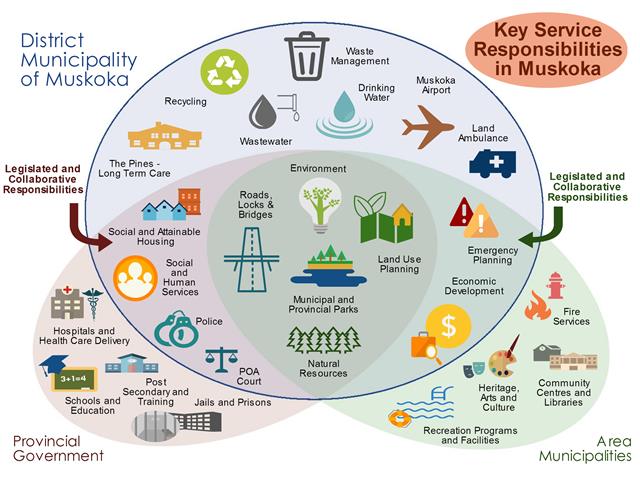FOM believes the following points should be considered in the Ontario government’s review of the upper-tier District of Muskoka and its six lower-tier municipalities (Bracebridge, Gravenhurst, Huntsville, Georgian Bay, Lake of Bays and Township of Muskoka Lakes):
- Three of our lower-tier municipalities (Township of Muskoka Lakes, Georgian Bay and Lake of Bays) have a seasonal resident base that is larger than the permanent resident base; combining them with municipalities that have a predominantly permanent resident base (such as Huntsville, Gravenhurst and Bracebridge) will give insufficient priority to the issues that drive an economy based on seasonal residents, including the protection of the environment and watershed.
- Given the differing priorities, lower tier municipalities should have control over decisions that affect their communities. This is particularly relevant to land use planning and development decisions.
- Lower-tier municipalities (Township of Muskoka Lakes, Georgian Bay and Lake of Bays) whose economies are driven by the environment and seasonal activity should have control over land use planning decisions and development on the waterfront.
- To improve the efficiency and effectiveness of land use planning decisions that are currently split between the District and lower tier municipalities, the District should retain oversight over land use policy, while the review and implementation of planning decisions should devolve to the lower tier municipalities.
- The District should continue to make decisions on items that have a common impact on or are shared among lower tier municipalities in order to achieve lower costs through economies of scale (eg. fire department, solid waste and water treatment, District roads, libraries). However, it will be more equitable for costs to be allocated among lower tier municipalities based on services delivered rather than assessed land values.
- Any cost savings from reducing the number of councillors will be minimal and is not worth the loss in effective voter representation on council. An amalgamated council could cut services to an area with a smaller number of voters in order to save costs (eg. close a small community centre or fire station).
- A Fraser Institute study of the outcome of municipal amalgamations in Ontario found no tangible benefit from amalgamations. In particular:
“We find significant increases in property taxes, compensation for municipal employees, and long-term debt in both amalgamated and unamalgamated communities, suggesting there was no tangible, financial benefit from amalgamation. In fact, many of the claims put forward by those favouring consolidation failed to materialize. In most of our cases, the per-household municipal tax burden increased.”
- Seasonal residents make up 57% of the District’s population, and contribute an even greater percentage of the District’s tax base as a result of high land values for their waterfront properties. As a result, seasonal residents pay the vast majority of the taxes in Muskoka but use few of the services, greatly benefiting the community. And, the majority of seasonal residents are already paying substantial taxes elsewhere in Ontario. Any change that would result in an increase in tax rates should be avoided.
- The Fraser Institute study also found that sharing services among municipalities (eg. paramedics, garbage collection, fire trucks) was a more effective way of finding efficiencies than amalgamations. The study reports:
“If the government of the day was truly interested in finding efficiencies at the local level, it might have been better off to pursue policies such as shared service agreements rather than municipal restructuring.”
- We agree, and note that Seguin Township effectively controls its costs through shared service agreements with neighbouring municipalities. Seguin currently has lower property tax rates than Muskoka and virtually no debt. Efficiencies in Muskoka are similarly being achieved through shared services and further efficiencies can be found in this manner without the need to resort to costly and disruptive municipal amalgamation.
- There is an urgent need for the Province to review the Muskoka River Watershed Management Plan to ensure this valuable provincial asset is protected in the long term. Last summer’s shocking increase in toxic algal blooms in Muskoka, and flooding again this spring, demonstrate that we need to do a better job.
How you can comment?
The government has asked for public comments until May 21, including what the public wants to see change and stay the same with their local governments. This government link describes the public consultation process, and provides details on how you can submit comments by email to [email protected], by mail, or through an online survey.
Parry Sound – Muskoka MPP Norm Miller is also encouraging residents to contact his office with comments ([email protected], 416.325.1012), which likely will be an effective way for your comments to be conveyed to Minister Clark and the review team.
Timing is tight since we expect Premier Ford will announce the results of the review in mid-August. We encourage our supporters to submit their comments as soon as possible.

